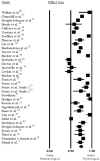Patient preference for psychological vs pharmacologic treatment of psychiatric disorders: a meta-analytic review
- PMID: 23842011
- PMCID: PMC4156137
- DOI: 10.4088/JCP.12r07757
Patient preference for psychological vs pharmacologic treatment of psychiatric disorders: a meta-analytic review
Abstract
Objective: Evidence-based practice involves the consideration of efficacy and effectiveness, clinical expertise, and patient preference in treatment selection. However, patient preference for psychiatric treatment has been understudied. The aim of this meta-analytic review was to provide an estimate of the proportion of patients preferring psychological treatment relative to medication for psychiatric disorders.
Data sources: A literature search was conducted using PubMed, PsycINFO, and the Cochrane Collaboration library through August 2011 for studies written in English that assessed adult patient preferences for the treatment of psychiatric disorders. The following search terms and subject headings were used in combination: patient preference, consumer preference, therapeutics, psychotherapy, drug therapy, mental disorders, depression, anxiety, insomnia, bipolar disorder, schizophrenia, substance-related disorder, eating disorder, and personality disorder. In addition, the reference sections of identified articles were examined to locate any additional articles not captured by this search.
Study selection: Studies that assessed preferred type of treatment and included at least 1 psychological treatment and 1 pharmacologic treatment were included. Of the 644 articles identified, 34 met criteria for inclusion.
Data extraction: Authors extracted relevant data including the proportion of participants reporting preference for psychological or pharmacologic treatment.
Results: The proportion of adult patients preferring psychological treatment was 0.75 (95% CI, 0.69-0.80), which was significantly higher than equivalent preference (ie, higher than 0.50; P < .001). Sensitivity analyses suggested that younger patients (P = .05) and women (P < .01) were significantly more likely to choose psychological treatment. A preference for psychological treatment was consistently evident in both treatment-seeking and unselected (ie, non-treatment-seeking) samples (P < .001 for both) but was somewhat stronger for unselected samples.
Conclusions: Aggregation of patient preferences across diverse settings yielded a significant 3-fold preference for psychological treatment. Given evidence for enhanced outcomes among those receiving their preferred psychiatric treatment and the trends for decreasing utilization of psychotherapy, strategies to maximize the linkage of patients to preferred care are needed.
© Copyright 2013 Physicians Postgraduate Press, Inc.
Figures
References
-
- American Psychological Association . APA Presidential Task Force on Evidence-based Practice. American Psychological Association; Washington, DC: 2006.
-
- American Psychiatric Association . American Psychiatric Association Practice Guidelines for the Treatment of Psychiatric Disorder Compendium. American Psychiatric Association; Arlington, VA: 2006.
-
- Barlow DH, Gorman JM, Shear MK, et al. Cognitive-behavioral therapy, imipramine, or their combination for panic disorder: A randomized controlled trial. JAMA. 2000;283(19):2529–2536. - PubMed
-
- Butler AC, Chapman JE, Forman EM, et al. The empirical status of cognitive-behavioral therapy: a review of meta-analyses. Clin Psychol Rev. 2006;26(1):17–31. - PubMed
-
- Dimidjian S, Hollon SD, Dobson KS, et al. Randomized trial of behavioral activation, cognitive therapy, and antidepressant medication in the acute treatment of adults with major depression. J Consult Clin Psychol. 2006;74(4):658–70. - PubMed
Publication types
MeSH terms
Substances
Grants and funding
LinkOut - more resources
Full Text Sources
Other Literature Sources
Medical
Miscellaneous



